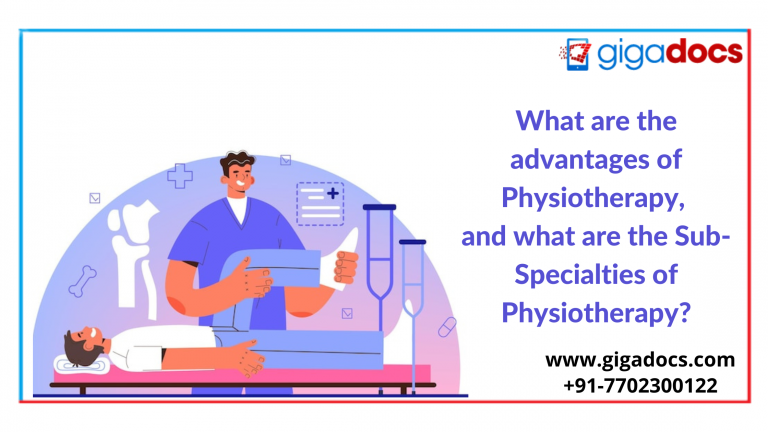Ever had an illness that made it difficult to move? A physiotherapist must have recommended a few exercises to help you get back on your feet. If you are wondering who a physiotherapist is? They are also known as physical therapists and assist patients in mobility, motor function, managing pain, and balance.
When should you see a physiotherapist?
You should consider physiotherapy if you have an injury or chronic pain that interferes with your daily functioning. Your doctor may refer you to physiotherapy after surgery, such as a hip replacement or an event like a heart attack or stroke.
Why Should You Consider Physiotherapy?
Physiotherapy needs formal education, and it requires a degree. Physiotherapists use their acquired knowledge and skills to treat a range of conditions related to:
- Cardiovascular (rehabilitation after a heart attack, chronic heart disease)
- Neuromusculoskeletal (arthritis, back pain, sports injuries)
- Neurological (Parkinson’s disease, stroke, multiple sclerosis)
- Respiratory (cystic fibrosis, asthma, chronic obstructive pulmonary disease).
World Physiotherapy Day
In 1996, the 8th of September was designated as World Physical Therapy Day; it was on this day in 1951 that World Physiotherapy was founded. The day honors the global physiotherapy community’s solidarity and unity. Let’s discuss physiotherapy in more detail, its benefits, and why you should consider it this Physiotherapy Day.
What Diseases Can Physical Therapy Treat?
The following is a list of diseases that can be treated solely through physical therapy sessions.
- Arthritis- You have got Arthritis when the joint surface deteriorates and successively results in joint inflammation. Physiotherapy can reduce chronic arthritis pain with therapeutic intervention; additionally, it can also improve the overall function of the joint.
- Dystrophy of the Muscle- As you get older or are affected by various disorders, your skeleton and muscles degenerate and weaken.
- Jaw pain- Temporomandibular Joint (TMJ) is distinguished by acute inflammation of the jaw. The therapy you receive will include anti-inflammation modalities, posture correction, and workouts. manual therapy, diet modifications, and therapeutic exercises.
- Chronic pains- In your back or neck always interrupts your daily routine. Thus, physical therapy aids in the treatment of pain and the facilitation of mobility.
- Vertigo- People often feel light-headed and dizzy, sometimes leading to dangerous falls. People sometimes feel it in general or sometimes frequently. But you can avoid it by balancing it through physical therapy. Thus, if you are suffering from vertigo, physical therapy is the answer.
- Headaches- Physiotherapy can help you in overcoming headaches caused by skeletal problems. Examples include muscle tightness and tension, a lack of neck motion, back stiffness, disc pathology, and poor posture. Depending on the nature of your problem, your treatment may range from using a hot water bag to posture training.
- Sports Injuries- Certain sports injuries can be treated, like stress fractures. A patient can also practice prevention exercises for quick and safe treatment.
- Whiplash- Whiplash results from a neck injury that causes rapid movement into flexion and extension. Most people sustain this injury due to a car accident or participation in a high-velocity contact sport. It can include spine movement assessment if you are considering physical therapy to treat whiplash symptoms. Depending on your condition, your treatment may consist of manual stretches, massage, and range of motion exercises.
- Parkinson’s disease- Parkinson’s disease is a neurological disease that causes a progressive movement disorder. It is a condition that can cause severe motor limitations and tremors. As a treatment, physical therapy and resistance strength exercises are prescribed by physiotherapists.
- Fracture of the foot is the most common disorder that can affect anyone after a minor fall. Foot fractures result in broken bones, which can be open, closed, or compound fractures, demonstrating the impact on your movement. The therapy prescribed to you is based on your condition’s severity and the fracture’s location.
- Cancer- Following cancer treatment, the post-treatment period is marked with pain and disability, significantly impacting the patient’s life. To manage its aftereffects, one can enroll in physical therapy to recover.
- Sciatica- A low back problem can induce pain down the leg. It is yet another condition that can be treated with physical therapy. The therapist may recommend muscle energy practices or core strengthening exercises as treatment.
- Lymphedema- When the excessive fluid gets stuck in your lymphatic system, it keeps moving around your bloodstream, causing swelling. The therapist uses CDT or complete decongestive therapy to lessen the swelling and avoid future fluid growth.
Physiotherapy Advantages
We have listed some conditions where physiotherapy has helped to achieve the best results –
- One can avoid Sports Injuries.
We understand that sports are all about agility, and different sports can increase the risk of specific conditions such as Hamstring Strain, ACL Tear, and Golfers Elbow. In such cases, physiotherapy is vital because it provides specific treatment to improve endurance and resolve the symptomatic problem. Aside from injuries, sportspeople and athletes benefit from regular physiotherapy sessions.
- Helps to avoid Surgery
Let’s face this. We are all living in tough pandemic times, and nobody wants to visit a hospital or undergo surgery. However, there are some unavoidable situations where surgery is the last resort. Physiotherapy can help avoid this by managing and healing in the initial stages. It is also helpful in pre- and post-rehabilitation programs to mitigate the complications that can occur during the surgery.
- Pain Management
The use of therapeutic techniques and exercises benefits patients suffering from tendonitis, arthritis, or muscle strain/sprain. These therapies help to relieve pain and restore normalcy.
- Increases Cardiovascular Capacity
Stroke surgery necessitates intensive care and a recovery program. Physiotherapy assists post-heart stroke patients in regaining their degree of mobility, movement, and balance.
- Manages Diabetes
Diabetes patients frequently experience discomforts such as knee, shoulder, and back pain, which is often the result of unbalanced sugar levels in the body. Diabetes-related pain can be managed with specialized physiotherapy plans. These plans also help with blood sugar control. Triangle Physiotherapy’s expert physiotherapists assist patients in learning about Diabetic Neuropathy, Diabetic Foot, and other conditions.
- Assists with Postpartum Care
Pregnancy is a wonderful experience. However, many women face difficulties on this journey as their bodies undergo fundamental changes that impact their overall well-being and health. Many women experience fluctuating hormones, difficulty performing routine activities due to increased body weight, changing habits, etc.
- Helps with Mental Health
Mental health is the most important of all the amazing benefits of physiotherapy. We’re not just talking about ‘feeling happy and healthy.’ We recognize that Mental Health is much more than that. Triangle Physiotherapy recognizes and promotes that feeling good in your body is essential for doing your daily chores and increasing your confidence in whatever you do and wherever you go. That is why we exist: to assist you in reaching your full potential.
- Aids in the Avoidance of Surgery
Let’s be honest. We are all living in difficult pandemic times, and no one wants to go to the hospital or have surgery. However, there are some unavoidable circumstances in which surgery is the last option. Physiotherapy can help to avoid this by managing and healing in the early stages. It is also beneficial in pre- and post-surgery rehabilitation programs to reduce the risks of complications.
- Reduces Reliance on Medications
Every medication a patient takes has a side effect at some point in their lives. Certain circumstances necessitate patients to take medications to control or treat their condition. However, in some cases, such as surgery, patients rely on medication for pain relief—physiotherapy is an alternative option to address this concern and reduce medication dependency and side effects.
- Encourages Physical Activity
It is not always easy to be old. It brings with it certain complications that interfere with daily life. Rheumatoid Arthritis (RA), sciatica, dementia, neck pain, back pain, knee replacement, osteoporosis, and other conditions fall into this category. Physiotherapy can control and manage all of these conditions. If you or a loved one is experiencing old age problems like these, we recommend checking out our psychotherapy experts on the Gigadocs app.
Sub-Specialties of Physiotherapy
- Physiotherapy for orthopedic/musculoskeletal conditions – This sub-specialty focuses on correcting deformities and treating ailments related to the human musculoskeletal system, which includes joints, tendons, muscles, ligaments, and bones. The primary goal is to reduce pain, increase mobilization, and correct the skeletal injury.
- Physiotherapy for children– Pediatric physiotherapists assist in treating acute injuries, congenital disabilities, delayed physical growth, and certain genetic defects such as cerebral palsy (a condition that restricts overall movement and coordination). Physiotherapists use a variety of therapeutic exercises in children to help strengthen the affected parts, improving the precision and overall movement of those parts.
- Cardiopulmonary exercise therapy – Patients with cardiopulmonary disorders such as cardiac arrest and chronic obstructive pulmonary disease are treated in this subspecialty. Cardiovascular rehabilitation centers are run by physiotherapists who educate patients on various exercises and resistance training techniques that can help them improve their overall quality of life.
- Physiotherapy for neurological conditions – Neurological conditions cause extreme muscle weakness, loss of balance and coordination, muscle spasms, tremors, loss of function, and decreased sensation. Neurological physiotherapy aims to restore mobility and treat functional disorders that arise from the nervous and neuromuscular systems, such as traumatic brain injuries, multiple sclerosis, spinal cord injuries, sciatica, Parkinson’s disease, and stroke.
- Physiotherapy for the elderly– This sub-specialty focuses on age-related medical conditions such as arthritis (joint pain) and osteoporosis (fragile and brittle bones). Geriatric physiotherapists advise the elderly on limiting certain movements that can aggravate pain and provide gait aids to improve overall mobility and reduce pain through various techniques and exercises.
Concussion
The number of people suffering from concussions is growing by the day. However, many people are unaware that physical therapy can help treat various trauma symptoms. Balance issues, headaches, and dizziness are among the symptoms. You can also enroll in a head injury and concussion management program, which benefits anyone who has had a concussion. Furthermore, even if you suspect trauma, you can participate in the activity.
To consult, download the Gigadocs App from-
- IOS App – apple.co/2W2iG4V
- Android App – bit.ly/33AQoR




